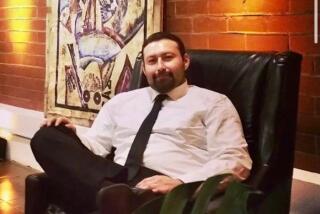Deputy’s Slaying Recounted
- Share via
A Ventura County prosecutor told a jury Tuesday that Michael Raymond Johnson gunned down a sheriff’s deputy last year to avoid being sent back to prison, and delivered a final execution-style shot to the fallen deputy before turning his gun on another officer.
“The reason we are here is because on July 17, 1996, that man,” bellowed Deputy Dist. Atty. Matthew Hardy in his opening statement as he pointed at the defendant, “made a decision to blow Peter Aguirre’s brains all over a house in Meiners Oaks rather than go back to prison.”
But Johnson’s defense lawyer told the jury that evidence in the case does not support the prosecution’s theory of first-degree murder.
Deputy Public Defender Todd Howeth said his client did not plan to kill Ventura County Sheriff’s Deputy Peter J. Aguirre Jr., and he questioned whether the rookie officer properly identified himself at the time of the shooting.
“We do not contest that Michael Johnson shot Deputy Aguirre,” Howeth told the jury in his opening statement. “We dispute and contest whether the shooting was done with premeditation and deliberation.”
The lawyers’ opening remarks were delivered before a courtroom crowded with spectators, including police officers and members of Aguirre’s family, who wept softly as Hardy explained in grisly detail the deputy’s fatal injuries.
Aguirre, 26, was one of three officers answering a domestic-disturbance call at the home of Johnson’s estranged wife in Meiners Oaks. Officers were called after the woman’s daughter told authorities Johnson had two guns and posed a threat to her mother.
As Aguirre stepped inside the house, Johnson burst from a shower with two guns and fired three shots at the deputy, hitting him twice, Hardy said.
Johnson then walked over to the fallen officer, whose gun was still in its holster, and delivered a fourth shot about 12 inches from his face, Hardy said.
After shooting Aguirre, Johnson ran naked from the house and began firing at Deputy James Fryhoff outside while trying to escape, Hardy said. Johnson was caught after Fryhoff wounded him in the chest.
Hardy told the jury that Johnson made a series of bad decisions on July 17, 1996, beginning with a decision to arm himself.
“And not just arm himself,” Hardy said, “but arm himself to the teeth.”
He said Johnson wielded two guns: .45-caliber and .32-caliber semiautomatic handguns. He also carried additional ammunition in a fanny pack and had two boxes of bullets in a briefcase in his car, Hardy said.
This “mini-arsenal,” the prosecutor suggested, was in the possession of a five-time felon who planned to use deadly force if necessary to stay out of jail.
The prosecutor told the jury that evidence will show that Johnson used the guns to kidnap and then rape his wife before attacking the two officers.
And the defendant’s own statement to a psychologist from a hospital bed shows that he knew what he was doing that afternoon, Hardy said.
But Howeth urged the jury in his opening remarks to listen carefully to the evidence.
He said that there is nothing to back up the prosecution’s claims that Johnson kidnapped and raped his wife.
He said that she went willingly with Johnson and engaged in consensual sex before the shooting occurred. Howeth also challenged the prosecution’s position that Johnson committed first-degree murder. He said that the shooting occurred too quickly for any premeditation.
He too pointed to the defendant’s statements to psychologist Donald Patterson, but suggested that they show his innocence on the murder charge--not his guilt.
“The evidence will show that on July 17, 1996, Michael Johnson snapped and committed an unpremeditated killing,” Howeth said.
Johnson’s trial is expected to span the next few months as Aguirre’s fellow officers, a police dispatcher, crime-scene experts and other witnesses take the stand.
If the Ventura resident is convicted of murder and at least one of the two special circumstances alleged in the case, the same jury would be asked to decide whether he should be punished by death or by life in prison.
At the conclusion of his opening statement, Hardy jumped ahead to that possible decision with a remark that ignited controversy outside the presence of the jury.
“The evidence will show,” he said, “that the wrong man died on July 17, 1996, and at the end of this case you will have an opportunity to do something about that.”
Howeth objected to the remark as improper for an opening statement, which is intended to provide an outline of the case. Superior Court Judge Steven Z. Perren agreed and later told the jury to disregard the comment.
But based on the prosecutor’s tone and responding statements by the defense, it became clear Tuesday that an emotional court battle lies ahead--one that will be closely watched by the county’s law enforcement community.
Aguirre, a lifetime Santa Paula resident, was the second Ventura County officer fatally shot while responding to a 911 call in the last three years.
Simi Valley Police Officer Michael F. Clark was gunned down in 1994 after trying to persuade a distraught schoolteacher to come out of his home.
As in Clark’s case, prosecutors are seeking the death penalty against Aguirre’s accused murderer.
And to spare their client from such a fate, defense attorneys indicated Tuesday that they plan to mount a defense similar to the one used in the Clark case, by questioning tactics used by law enforcement officials.
Testimony in the case is set to resume Thursday morning.
More to Read
Sign up for Essential California
The most important California stories and recommendations in your inbox every morning.
You may occasionally receive promotional content from the Los Angeles Times.










